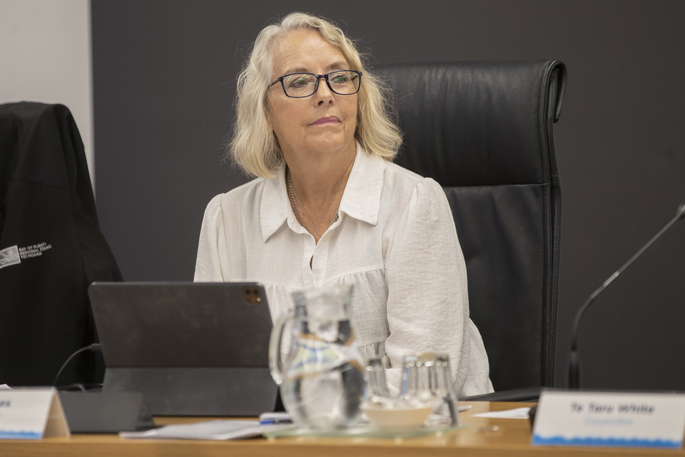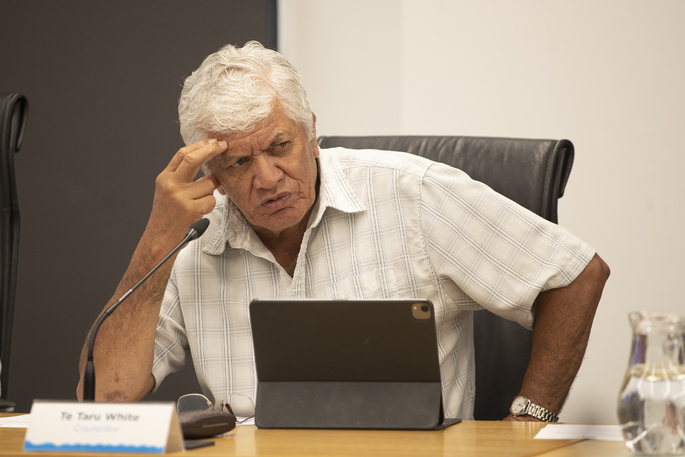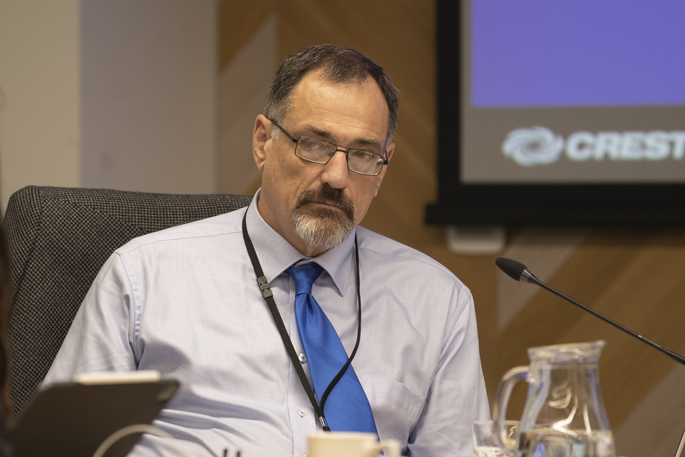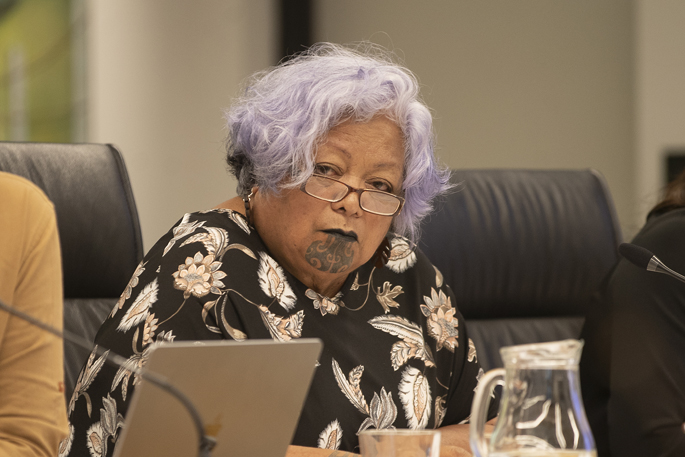The te reo phrase Te Ara Poutama has caused division amongst councillors at a Bay of Plenty Regional Council meeting.
The councillors argued whether an English translation of the phrase should be used in the regional council's strategic direction document during the annual plan deliberations today.
One councillor said she was 'disheartened” the Māori translation was being 'picked at” because it had been prepared by an expert in Te Reo Māori.
The document outlines the council's vision, values and the community outcomes it is seeking, in both English and Māori.
Councillor Jane Nees questioned why the outcome Te Ara Poutama, meaning pathway to excellence, did not have a direct English translation in the document like the other four outcomes.
'Te ara poutama, to our English speakers that does not mean anything."
 Councillor Janes Nees wanted an English version of the phrase te ara poutama included in the council's strategic direction. Photo: John Borren/SunLive.
Councillor Janes Nees wanted an English version of the phrase te ara poutama included in the council's strategic direction. Photo: John Borren/SunLive.
'I think it's quite appropriate that we have an approximation for the English version of te ara poutama,” she said.
Regional council general manager, strategy and science Namouta Poutasi, who was presenting the document, said if councillors wanted the translation the staff were open to their direction.
'Often it does become difficult when you're translating something to get the full essence of what's been proposed, but certainly if that's the direction we will make that change.”
Poutasi said the strategic direction document was the culmination of four workshops and it was fundamental to the development of the long-term plan.
Councillor Ron Scott said if the council had spent 'thousands on translations” then they may as well translate each language into the alternative.
'I would be very keen to have the te reo part translated to English to help understanding of our ratepayers.”
 Councillor Te Taru White said the Māori version added "holistic depth" to the document. Photo: John Borren/SunLive.
Councillor Te Taru White said the Māori version added "holistic depth" to the document. Photo: John Borren/SunLive.
Ōkurei constituency councillor Te Taru White said if they wanted the interpretation of Māori into English then they might end up with another volume.
He suggested a glossary as 'an appropriate way to look at that particular translation”.
'Te ara poutama - the stairways to excellence comes with all sorts of stories around the stairways to the heavens and the heavens back to us. It's all a very integrated holistic meaning,” he said.
'Māori translations are there to really give holistic depth to what we do, in my view. Some added quality and value it's not there to disrupt the directions we want to head in.”
Councillor Matemoana McDonald said the translator they used was an expert in te reo Māori.
'There will always a point of difference in the translations when you're looking from the perspective of Māori … and non- Māori.
'Have faith in the translator's words and what we are trying to achieve.”
Councillor Andrew von Dadelszen suggested leaving te ara poutama as it was in the document but adding a footnote with the English translation.
'When you look at the strategic direction and vision having te reo and then the English version we've done that for a long time and I think that's appropriate.
'We want to take our community with us that's the key thing, so we don't want to people frighten by not understanding.”
 Councillor Ron Scott said he was "very keen" to have the Māori translated into English to help ratepayers' understanding. Photo: John Borren/SunLive.
Councillor Ron Scott said he was "very keen" to have the Māori translated into English to help ratepayers' understanding. Photo: John Borren/SunLive.
Scott said an 'issue” that 'worried him a little bit” was if there was a difference between the versions.
'If there's a difference of understanding, well we've gone all the way back to 1840 haven't we?
'We've created exactly the problem that is still causing grief a century and a half later, so we have to be very careful about what is the document that we are relying on and what is the meaning of any translations.”
McDonald responded: 'We had agreed that we will do the translations for this document and we have.
'Now I'm kind of disheartened that we're starting to pick at the translation.”
She said while the Māori translation was not a 'total transliteration” it was 'in the spirit” of the language and was what the council was trying to achieve through the document.
Nees, who was chairing the meeting, asked councillors to indicate whether an English translation of te ara poutama should be added.
Five councillors were for the translation and five were against.
Councillor Paula Thompson suggested adding the English translation so the council could 'tick off” the document and 'move on”.
White said the English translation was pathway to excellence. He said if people had 'issues” with particular descriptors in the reo the council should have a process for it.
'If somebody has got a question we should be able to answer it. It alleviates the need for going through the whole damn document and explaining every damn word in detail.”
The council voted to add the wording 'pathway to excellence' to the te ara poutama outcome and endorsed the strategic direction.
Public Interest Journalism funded through NZ On Air




16 comments
Disasters are coming our way
Posted on 25-05-2023 18:29 | By Johnney
Why do you air traffic control and shipping use English. To avoid disasters. Say no more.
Really sad.....
Posted on 25-05-2023 18:58 | By groutby
...to know this group are hamstrung in making important decisions when they are confronted by this sort of stuff....hell....no progress possible at all is there and ratepayers foot the cost for no progress whatsoever...if anything go backwards?....
Te Reo Maori
Posted on 25-05-2023 20:22 | By Equality
With a population of around 16% of Maori living in NZ - and then only a small proportion of that 16% able to speak or understand Maori - is this fair? To foist this totally foreign language upon the other 84% of the population is something that the 84% is unhappy about! Might as well be written in Swahili. The council represents ALL ratepayers not a small ethnic minority. NZ is being divided into them and us. And 'US' do not Like it!!!
Enough
Posted on 25-05-2023 21:26 | By Andrew64
A fraction of the population understands maori so why is it so prevalent? All government and council works should be English so everyone understands
Wow
Posted on 25-05-2023 21:39 | By Naysay
Astonishing that you are all New Zealanders and educated in New Zealand. Yet you can not embrace your origins of your culture nor your offical language. When you take a seat at the council table you represent everyone not yourself.
maori
Posted on 26-05-2023 08:27 | By dumbkof2
all official govt and council business should be conducted only in english. that way there can be no misunderstanding of what was said and done
Excellent!
Posted on 26-05-2023 08:50 | By B.C.
Thanks Sunlive, I found this genuinely amusing. Here's paid councillors debating about translating the phrase "pathways to excellence". The winner of the debate can be presented with an award for outstanding achievement in the field of excellence.
Easy Solution
Posted on 26-05-2023 11:35 | By Gigilo
A fraction of New Zealanders understand Māori, even those who identify as Māori. All documents should be produced in proper English and in full Māori for those who have a preference of reading it that way. The same should apply to journalism, reading the pigeon editorials is frustrating and the meaning of the dialogue is lost.
Said it before...
Posted on 26-05-2023 12:59 | By morepork
... and I say it again: Te Reo is not as precise as English. It is because of the cultural difference. English terms have a standard, checkable, authority (Oxford or Websters) that precisely defines their meaning, while Te Reo has much more latitude in its use. (I see Te Reo as more like the "Romance Languages" in Europe.) I would translate "te ara poutama" as "the right way". Decide for yourself whether "pathway to excellence" means the same, or is "near enough" for the purpose. It comes down to shades of meaning, and official documents can't afford that kind of indulgence. It is farcical that English is not an official language for NZ, while Te Reo is. That needs changing as a matter of urgency. English should be the primary source for all official documents, with a Te Reo translation always also available.
English and Maori.
Posted on 26-05-2023 13:17 | By morepork
While English is not an offical language for NZ, it IS the "lingua franca" for the world, and has supplanted the Diplomatic use of French in most countries. There are good reasons for that; English is precise and has defined authority which can be checked, and is not subject to tribal or regional differences in meaning. Churchill said England and America were two countries separated by a common language, and there ARE dialects of English in use all over the world. But, when the chips are down, the meaning can be checked by accepted authority and is not subject to argument. Like all languages, English evolves and changes, but those changes are reflected in the authority and updated every year. Te Reo beautifully reflects Maoritanga and culture and IS subject to regional differences. It has evolved for storytelling and not defining legislation. We should embrace both, but recognize differences.
@naysay
Posted on 26-05-2023 13:32 | By morepork
You rightly point out that we have difficulties with our "official" language, but you are misled about our culture and origins. We are a diverse nation of over 128 different nationalities and backgrounds. We strive to be fair to all of them, but Maori have a special place. There is a real danger of that causing divisions that will lead to an Apartheid state, and (almost) nobody wants that. I'm a Kiwi, born here and I DO embrace my origins and my culture. I see Maoritanga as part of my culture (and value it), but I will not dismiss the thousands of years of European culture which are part of my bloodline and origin. Neither will I see that part of my culture overwhelmed by Political Correctness to favour a different ethnicity. (I wouldn't see Maoritanga overwhelmed either...). It is more complex than you seem to realize.
Yet another attempt
Posted on 27-05-2023 08:32 | By R. Bell
to marginalise Maori. It worked in the past, so why not now? Those who are too lazy or incapable of including Te Reo in their skill set should not seek to reresent anyone in NZ.
Hmmm
Posted on 27-05-2023 12:59 | By Let's get real
Major international deals are carried out around the world with the English language documents being accepted as the true intentions of the discussions. However, we will never be able to reach agreement in government or Council chambers because apparently we need Te Reo "experts" to help those arguing a point because even they don't understand the language that they insist has to be used. Third world thinking.
@R. Bell
Posted on 28-05-2023 13:58 | By morepork
Robin, nobody is trying to marginalize Maori or Te Reo here. This is something I feel very strongly about and, if you read my posts in this thread you will see that. It is a fact (like it or not) that most of the population (including many Maori) do NOT speak Te Reo. They feel that it is being imposed on them and "shoved down their throats". And so, there is resistance. It is a trait in Kiwis that most of us resist enforcement and mandate. Rather than claiming victimization, why not work to encourage people to take an interest? Would you be prepared to sign a petition for English to be made an official language? (As well as Te Reo) Ask yourself if your objection is because of a chip you are carrying or bitterness because of past experience. How can you address this?
Urgent English.
Posted on 28-05-2023 14:13 | By morepork
For the reasons outlined in my responses here, we should be working to get English recognized as an official language for our nation. I would also encourage people to at least be able to pronounce Te Reo and if you have some spare time, learn (at least) some of it. It IS part of Kiwi culture (for all non-Maori) and we should embrace it. We have a terrible situation where 35% of our 15 year-olds struggle to read English (never mind Te Reo). Most of our kids don't read books and that may be the reason for it. You can't MAKE people learn a language; the best you can do is encourage them. I decided to learn Te Reo because I was ashamed that I speak 4 languages, and not the native language of my own land. Whatever the motivation, we NEED English to be an official language.
Morepork it is
Posted on 29-05-2023 12:51 | By R. Bell
false equivalence to equate the use of te reo to the use of the English language. English became an international language due to the history of british empire building and thousands of years of absorption of other languages. There is no rational suggestion that one can replace the other. Your paranoia is not uncommon, but is as unfounded as your belief than anyone writing under a false name can be taken seriously on such an important subject.
Leave a Comment
You must be logged in to make a comment.